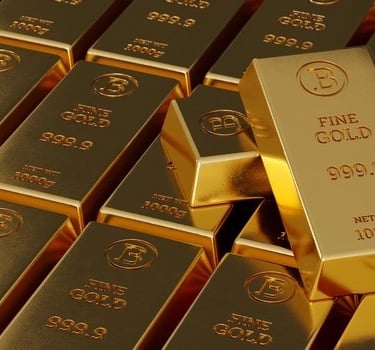Geopolitical Tensions Impacting the Global Economy: Risk Analysis and Safe Haven Strategies
Geopolitical upheavals—particularly the trade war between the United States and China, sanctions against Russia, and structural issues within the European Union—are posing significant global economic challenges. These events are disrupting markets, straining supply chains, and increasing uncertainty among investors. This article aims to analyze, using recent statistics and economic data, how these crises affect the global economy—and to explain why gold, and increasingly cash, are returning as key safe-haven assets in uncertain times.
ECONOMY
João da Encarnação
10/22/20243 min read


The U.S.–China Trade War: A Burden on the Global Economy
Since 2018, the world’s two largest economies have been engaged in a trade war that has caused widespread disruption in international commerce. According to a 2023 World Bank study, tariffs imposed by both countries have shaved approximately 1.4% off global growth. Global supply chains, which had intensified through globalization, have been severely impacted. This has led to higher consumer prices, reduced profitability for certain industries, and increased market volatility.
Sectors such as electronics have been especially hard-hit, revealing critical dependencies on China for semiconductors and key components. The World Trade Organization forecast that global trade growth would slow to 1.7% in 2023, compared to a historical average of 3.5%, largely due to tensions between these two economic giants.
Sanctions on Russia: Consequences Far Beyond Its Borders
Russia’s 2022 invasion of Ukraine triggered a wave of unprecedented economic sanctions, affecting not only the Russian economy but also global markets. Europe’s dependency on Russian fossil fuels sparked a major energy crisis. According to Eurostat, nearly 40% of the EU’s natural gas came from Russia in 2022. The sudden interruption of this supply drove energy prices sharply upward and pushed Germany into stagnation.
Inflation soared as a result: according to the European Central Bank, eurozone inflation reached 10.6% in 2022—far above the 2% target. The energy shock also impacted manufacturing industries and food supply chains, raising fears of prolonged stagflation—a period of low growth combined with high inflation.
Structural Challenges Within the European Union: The Draghi Report
Former ECB President Mario Draghi recently published a report outlining the structural weaknesses facing the European Union, including competitiveness gaps, declining productivity, and fragmentation. Draghi warned that without swift reform, the EU risks falling behind the U.S. and China. Key issues include overregulation, aging populations, and excessive reliance on foreign technologies.
According to the report, productivity growth in the eurozone has averaged just 0.5% since 2015, compared to 1.8% in the U.S. Political fragmentation within the EU—exacerbated by Brexit and internal divisions on topics like immigration—continues to delay critical economic decisions, hampering the EU’s ability to adapt and remain competitive.
Gold—and Cash—Regain Their Place as Safe Havens
Gold has broken records since last Friday, surpassing $2,700 and continuing to climb. At the time of writing, it stands at $2,735.9. In times of geopolitical and economic instability, gold reasserts itself as a premier safe-haven asset. In 2023, its price rose by 8% in response to trade tensions and sanctions. Gold is especially valued during periods of high inflation and uncertainty because it is uncorrelated with equity and bond markets.
But beyond gold, cash itself is increasingly seen as a strategic refuge. In an era of market volatility and liquidity crises, investors and institutions are holding larger reserves of cash to preserve optionality and respond quickly to sudden shocks. While cash may lose value in inflationary periods, its immediacy, neutrality, and universal acceptance make it a cornerstone of risk management strategies in uncertain times.
According to the World Gold Council, central bank gold purchases reached record levels in 2023, especially in Asia, where China and India are fortifying their reserves to guard against global instability. The inverse correlation between gold and the U.S. dollar also makes gold a vital tool for portfolio diversification.
Conclusion
Geopolitical instability and economic sanctions are reshaping global financial dynamics. The U.S.–China trade war, sanctions on Russia, and structural fragilities in the EU pose serious risks to global growth. In this context, investors must rethink their strategies, turning to shock-resistant assets—such as gold and even cash—to mitigate risks and safeguard their wealth amid ongoing turbulence.
Sources:
https://business.cornell.edu/hub/2024/06/14/trade-titans-impact-us-china-trade-war-global-economics/
https://www.raiffeisen.ch/rch/fr/connaissances/placer/pourquoi-investir-dans-l-or.html
Image Credit: Authormurrstock@yandex.via Depositphotos
